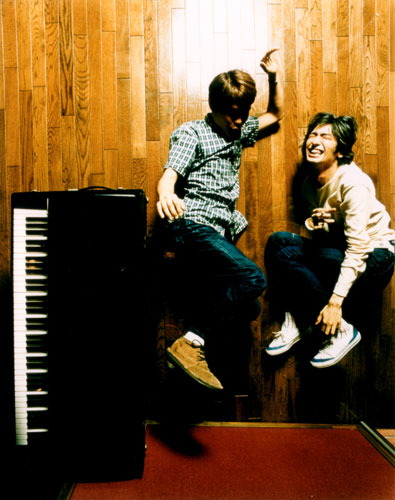I hear the drummer strike the sky. I hear the drummer strike the sky!
... So naturally, as a consequence of becoming enraptured by Shibuya-kei and J-Pop over ten years ago, I thought it prudent to see what had become of Japan's alternative hip hop produce since everyone's favourite abstruse-trivia-wielding-and-limited-edition-promotional-toys-branding, abstract instrumental hip hop label Mo' Wax first enticed me with it in 1997. Finding the very moment where Japanese hip hop very much became something worth taking seriously (and to much surprise, that moment actually occurred before the end of the 1980s), James Lavelle's infamous concern issued a beautifully sturdy and artfully rendered boxset of over 40 songs released by Major Force, an exuberant imprint with a fine niche in broken English rap, deeply technical sensibilities, sample-seeking nous to rival their American counterparts and a particular attention to composition that broadened the compilation's appeal amongst demographics that could not easily stomach mangled hip hop slang in slightly off-putting vocal timbres
8 years following my first experience with "Dope up cyber-rap from Tokyo" brought time wasted with DJs like Halfby and wee papa girl rappers like Halcali - a mainstream-breaking duo not much unlike their Major Force XX chromosome MC forebears The Orchids - but for all their talent, none were as adept at the indelibly memorable, 1970s-impelled party record as the one they called Handsomeboy Technique. Probably a disco biscuits-thing
Adelie Land comfortably rests in the cut-and-paste party music canon that bursts with luminaries such as Steinski, The Dust Brothers, Coldcut and other DJ-producers for whom the 1980s was a testing ground for musical domination, though the beatific sequences, jaunty 1970s radio polish and heady psychedelic thread that distinguish the record are more in thrall to the itinerant beauty and density of The Avalanches' Since I Left You. Be that as it may, Yoshitaka Morino's debut LP is light on complexity and motors along on repetition, but it also simply gorges on effusiveness and what some particularly enthusiastic dancers and afficionados like to refer to as "the funk." And had this album a wider reach beyond its native Japan, many a breakdancing competition sequence could have been choreographed to the likes of the 'Shake Your Body (Down to the Ground)'-sampling 'Miami Radio Flash' or the cheery, vintage rap of 'Season of Young Mouss,' whose childish go-go delights also mark Handsomeboy Technique as a potent contemporary of that more ramshackle and less rewarding concern, The Go! Team
But in taking cues from his forebears to craft a wider scope, Morino successfully taps not only into the celebratory, but the wistful sides of nostalgia that can make it a more compelling aural aesthetic. The soulful 'Quiet Place' is one contemplative mood shy of a megrim, with bursts of strings and keys that apparate like primary colours in a paintball contest. This is also felt in the lone piano opening of 'Adelie Coast Waltz' (practically a direct reference to the exceedingly similar 'Two Hearts in 3/4 Time' of Since I Left You) through to the sweep of its twee disco romanticism that sounds much like the end of a beautiful "something" should, whilst my favourite cut, ''8000 Laurels,' combines the exuberant patter of a motoring hip hop break and a beatbox with a hooky tempest of turntable swerves, minor key choral vocals and orchestral grandeur gone pop, thanks to a particularly indelible keyboard line. With such a percolating emotional reach, it is no wonder that the closing 'Your Blessings' emphasises - thought not overwhelmingly so - the celebratory approach to end the proceedings, but cannily, it chooses the joy-in-living sonics and sentiments of Freda Payne's 'Cherish What is Dear To You' or the Motown sound (or rather a sample of The Cake's Spector-esque 'Baby That's Me') over simple, hedonistic joy. And that, to me, is always a tune worth stepping out to
But in taking cues from his forebears to craft a wider scope, Morino successfully taps not only into the celebratory, but the wistful sides of nostalgia that can make it a more compelling aural aesthetic. The soulful 'Quiet Place' is one contemplative mood shy of a megrim, with bursts of strings and keys that apparate like primary colours in a paintball contest. This is also felt in the lone piano opening of 'Adelie Coast Waltz' (practically a direct reference to the exceedingly similar 'Two Hearts in 3/4 Time' of Since I Left You) through to the sweep of its twee disco romanticism that sounds much like the end of a beautiful "something" should, whilst my favourite cut, ''8000 Laurels,' combines the exuberant patter of a motoring hip hop break and a beatbox with a hooky tempest of turntable swerves, minor key choral vocals and orchestral grandeur gone pop, thanks to a particularly indelible keyboard line. With such a percolating emotional reach, it is no wonder that the closing 'Your Blessings' emphasises - thought not overwhelmingly so - the celebratory approach to end the proceedings, but cannily, it chooses the joy-in-living sonics and sentiments of Freda Payne's 'Cherish What is Dear To You' or the Motown sound (or rather a sample of The Cake's Spector-esque 'Baby That's Me') over simple, hedonistic joy. And that, to me, is always a tune worth stepping out to













